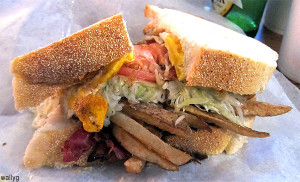One burger joint in Pittsburgh has repeatedly kept raw hamburger meat, lettuce and coleslaw at temperatures that allow bacteria to flourish. A chain restaurant’s worst violations in the past three years were a missing floor tile and a dirty floor drain.
 Both restaurants have maintained their approved-to-operate green stickers from the Allegheny County Health Department, but one would’ve earned a ‘C’ and the other an ‘A’ if the county’s attempts to institute a restaurant grading system had passed.
Both restaurants have maintained their approved-to-operate green stickers from the Allegheny County Health Department, but one would’ve earned a ‘C’ and the other an ‘A’ if the county’s attempts to institute a restaurant grading system had passed.
Nearly all of the roughly 4,200 restaurants in the county have a green sticker — no matter whether it had five high-risk health violations in its last inspection or none.
There have been two failed attempts, most recently in May, to pass an A-B-C restaurant grading system that could give consumers more refined health information at a key decision-making point — entering a restaurant.
Although the Allegheny County Health Department supported the change, the county council voted the A-B-C system down 12-1. Everyone who spoke at the meeting opposed the measure. Most were from the restaurant industry.
PublicSource wondered why there was so little support for the measure when the Centers for Disease Control and Prevention estimates about one in six people get a foodborne-related illness a year.
So, we acquired the criteria for the potential grading system and records of health inspections from July 2014 through April 2015. The result of combining the two is a look at how county restaurants would have scored under the letter grading system.
About three-quarters of nearly 5,000 restaurant inspections in the county would’ve resulted in an ‘A’, according to the PublicSource analysis.
About 18 percent of inspections would’ve earned a ‘B’ and 6 percent would’ve gotten a ‘C’ grade. A ‘C’ grade could include multiple high-risk violations, such as cutting lettuce on the same surface as raw meat, in addition to several medium- and low-risk violations.
The analysis started with July 2014 because that’s when inspectors started assigning a level of severity to each health inspection violation.
The analysis showed there were 57 inspections in that 10-month period that would’ve fallen below a ‘C’ and warranted an alert or closure by the health department.
 The health department actually issued just 11 consumer alerts and closed 11 restaurants.
The health department actually issued just 11 consumer alerts and closed 11 restaurants.
“When we examined the number of violations that were occurring on first inspection and also the number of repeat visits that we were being required to do, it was very apparent that there needed to be changes made” to the inspection system, said Dr. Karen Hacker, head of the Allegheny County Health Department.
But the county council voted the measure down. “The council represents the populace so we must abide by that decision,” Hacker said.
Allegheny County has a green, yellow and red system, which basically operates as a pass or fail method.
Green means a restaurant is permitted to operate; yellow means the health department issued an alert to warn consumers about poor health conditions; and red means the restaurant was ordered to close.
It wasn’t always this way. Pittsburgh had an A-B-C grading system, along with many other cities, after World War II. Allegheny County instituted its current system in 1994.
Kevin Joyce, owner of The Carlton Restaurant, a white-tablecloth restaurant in downtown Pittsburgh, was a chief opponent of the recent proposal to change the system. He said, “I think what a green rating means is that it’s a place that’s safe to eat — that the county’s inspected it and it’s safe to eat.”
However, as PublicSource found, there’s a wide spectrum of cleanliness in the kitchen among restaurants operating with a green sticker.
About 18 percent of inspections would have resulted in a perfect score during the 10-month period studied, while 12 percent had at least two-high risk violations in a single inspection.
The most common high-risk violations include not following cleanliness guidelines and not keeping food hot or cold enough.
Several of the city’s well-known chefs and restaurant owners declined to be interviewed about the grading system.
Consumers might not be aware of problems at restaurants unless they go to the health department’s website to view inspection reports.
John Graf, who owns the Priory Hotel on the North Side and is vice chair of the Pennsylvania Restaurant and Lodging Association board, said the inspection reports provide the best information to consumers.
“How long does it take to go to the county website?” Graf said. “People are on Google or Facebook for hours on end, you know, use your smartphone and look it up. I don’t see that that’s a huge barrier.”
Doug Powell, a former food safety professor at Kansas State University and co-author of the food safety blog BarfBlog, said health information is most effective at the point of sale.
“The value of grading systems at the door is that most people make decisions when they walk up to the restaurant,” Powell said. “They’re not going to look online. Lots of places have tried putting up websites and other things, but most people are going to make decisions when they go to the door.”
As an alternative, the Allegheny County Health Department is exploring the idea of putting QR codes on restaurants, so someone with a smartphone could scan the code and see the restaurant’s health inspections.












